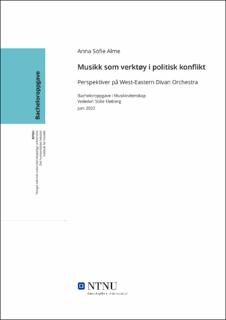| dc.contributor.advisor | Kleiberg, Ståle | |
| dc.contributor.author | Alme, Anna Sofie | |
| dc.date.accessioned | 2022-07-07T17:19:53Z | |
| dc.date.available | 2022-07-07T17:19:53Z | |
| dc.date.issued | 2022 | |
| dc.identifier | no.ntnu:inspera:112790664:66379650 | |
| dc.identifier.uri | https://hdl.handle.net/11250/3003606 | |
| dc.description.abstract | West-Eastern Divan Orchestra har siden etableringen i 1999 vekket stor oppsikt. Orkesteret har en påvirkningskraft som strekker seg forbi den musikalske verdenen, og har fort blitt anerkjent av kritikere og media som et av de mest interessante aktive ensemblene i det globale musikkmiljøet. Temaet i denne bacheloroppgaven er musikk som verktøy i politisk konflikt, i lys av West-Eastern Divan Orchestra. Problemstillingen lyder slik: Hva slags reell påvirkningskraft har West-Eastern Divan Orchestra for de involverte partene i Palestina/Israel-konflikten, og kan kulturtilbud som dette gjøre endringer i en politisk konflikt?
Teoretisk tyngdepunkt ligger i Olivier Urbain sin forskningsartikkel Peacebuilding 2020: Music and Arts in Action (2020), som tar for seg Johan Galtung og Marcia Ostashewskis tidligere tekster om fredsskapende teori i lys av musikk, i tillegg til The Transformation of Peace (2005) av Olivier Richmond.
For å svare på problemstillingen legger teksten frem et utvalg av perspektiver rundt orkesterets virksomhet, og tar blant annet for seg motsetninger rundt orkesterets repertoar og virke. Ved å ta utgangspunkt i «Timeglass-modellen» etter Oliver Ramsbotham, Hugh Miall, Tom Woodhouse argumenteres det for at kulturelle fredsbyggende initiativ som West-Eastern Divan Orchestra vil være mindre fungerende hvis de blir iverksatt på feil tidspunkt i den fredsbyggende prosessen. Hovedfunn i teksten går ut på at ved å ikke legge til rette for et tilfredsstillende forum for dialog tilrettelagt for medlemmene i orkesteret, vil ikke West-Eastern Divan Orchestra utrette det meglende arbeidet de hevder at de gjør (brobygging mellom arabiske og israelske musikere gjennom musisering og dialog). Teksten konkluderer at orkesteret på mange måter gjenskaper elementer fra konflikten gjennom maktstrukturen i hierarkiet som ligger i symfoniorkesteret, der Barenboim opptrer som øverste leder. | |
| dc.description.abstract | Since its establishment in 1999, the West-Eastern Divan Orchestra has firmly established itself in the global music scene. The orchestras reputation has influenced not only the musical world, but in political landscape in the Middle East, and has been acknowledged by critics and media as one of the most remarkable active ensembles today. The theme of this bachelor thesis is music as a tool in political conflict, in the light of the West-Eastern Divan Orchestra. The thesis question is as follows: What kind of real influence does the West-Eastern Divan Orchestra have for the parties involved in the Palestine / Israel conflict, and can cultural programs of its kind play a part in transforming a political conflict?
Theoretical focus lies in Olivier Urbain's research article Peacebuilding 2020: Music and Arts in Action (2020), which addresses Johan Galtung and Marcia Ostashewski's earlier writings on peacebuilding theory in light of music, in addition to The Transformation of Peace (2005) by Olivier Richmond.
To address the thesis question, the text presents a selection of perspectives on the orchestra's activities, and addresses, among other things, contradictions around the orchestra's repertoire and efforts. Based on the "Hourglass model" after Oliver Ramsbotham, Hugh Miall, Tom Woodhouse, the text argues that cultural peacebuilding initiatives such as the West-Eastern Divan Orchestra will be less effective if implemented at the wrong time in the peacebuilding process. The main findings in the text lies in the fact that by not facilitating a satisfactory forum for dialogue that is to the liking of the members of the orchestra, the West-Eastern Divan Orchestra will not carry out the reconciling work they claim they are doing (connecting the gap between Arab and Israeli musicians through music making and dialogue). The text concludes that the orchestra in many ways recreates elements from the conflict through the hierarchy that is the basic principle of the symphonic orchestra, where Barenboim acts as the definitive leader. | |
| dc.language | nob | |
| dc.publisher | NTNU | |
| dc.title | Musikk som verktøy i politisk konflikt –
Perspektiver på West-Eastern Divan Orchestra | |
| dc.type | Bachelor thesis | |
